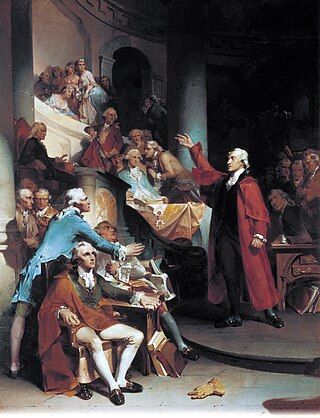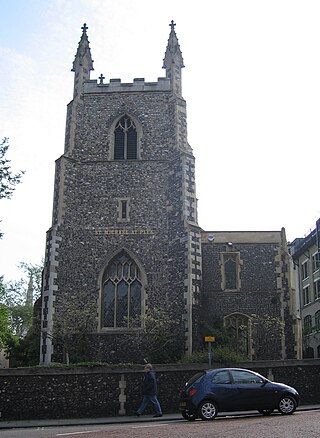Related Research Articles

The House of Burgesses was the lower house of the Virginia General Assembly from 1619 to 1776. It existed during the colonial history of the United States when Virginia was a British colony. From 1642 to 1776, the House of Burgesses was an important feature of Virginian politics, alongside the Crown-appointed colonial governor and the Virginia Governor's Council, the upper house of the General Assembly.

The Virginia General Assembly is the legislative body of the Commonwealth of Virginia, the oldest continuous law-making body in the Western Hemisphere, and the first elected legislative assembly in the New World. It was established on July 30, 1619.

Sir George Yeardley was a planter and colonial governor of the colony of Virginia. He was also among the first slaveowners in Colonial America. A survivor of the Virginia Company of London's ill-fated 1609 Third Supply Mission, whose flagship, the Sea Venture, was shipwrecked on Bermuda for ten months, he is best remembered for presiding over the initial session of the first representative legislative body in Virginia in 1619. With representatives from throughout the settled portion of the colony the group became known as the House of Burgesses and continued to meet, becoming the Virginia General Assembly.
Samuel Jordan was an early settler and Ancient Planter of colonial Jamestown. He arrived in Virginia around 1610, and served as a Burgess in the first representative legislative session in North America. Jordan patented a plantation which he called "Beggar's Bush", which later became known as Jordan's Journey. It became a safe haven and stronghold for settlers during the Second Anglo-Powhatan War that ensued after the Powhatan surprise attack of 1622.

The Virginia House of Delegates is one of the two houses of the Virginia General Assembly, the other being the Senate of Virginia. It has 100 members elected for terms of two years; unlike most states, these elections take place during odd-numbered years. The House is presided over by the Speaker of the House, who is elected from among the House membership by the Delegates. The Speaker is usually a member of the majority party and, as Speaker, becomes the most powerful member of the House. The House shares legislative power with the Senate, the upper house of the General Assembly. The House of Delegates is the modern-day successor to the colonial House of Burgesses, which first met at Jamestown in 1619. It is the first and oldest continuous English-Speaking representative legislative assembly in the Western Hemisphere. The House is divided into Democratic and Republican caucuses. In addition to the Speaker, there is a majority leader, majority whip, majority caucus chair, minority leader, minority whip, minority caucus chair, and the chairs of the several committees of the House.

Philip Cottington Ludwell was an English-born planter and politician in colonial Virginia who sat on the Virginia Governor's Council, the first of three generations of men with the same name to do so, and briefly served as speaker of the House of Burgesses. In addition to operating plantations in Virginia using enslaved labor, Ludwell also served as the first governor of the Carolinas, during the colony's transition from proprietary rule to royal colony.
Christopher Lawne was an English merchant and Puritan of note, who was among the earliest settlers in the Virginia Colony in the early 17th century. Born in Blandford, Dorset, he emigrated on his ship, the Marigold in May, 1618, and died in Virginia the following year.

William Moss Capps, Sr. was born in Norfolk, England in or around 1575. William married Catherine Jernagin in Norwich, Norfolk, England, 11-Dec-1596, at St. Michael at Plea. He and his wife had five children together: Henry, Frances, Willoughby, Anne, and William.
Theodorick Bland, also known as Theodorick Bland of Westover, was a planter, merchant and politician in colonial Virginia who served as Speaker of the House of Burgesses, as well as in both houses of the Virginia General Assembly. The founder of the Bland family of Virginia, his son and grandson of the same name also served in the Virginia General Assembly before the American Revolutionary War, and later descendants sharing the same name would become a federal judge and congressman.
William Powell, was an early Virginia colonist, landowner, militia officer and legislator. Considered an ancient planter for living in the Virginia colony during its first decade, he was one of two representatives from what became James City County, Virginia in the first Virginia House of Burgesses in 1619. His former plantation, now across the James River in Surry County, Virginia is now within Chippokes State Park.
Ensign Thomas Washer was an early Virginia colonist who settled in the area that became Isle of Wight County, Virginia. Washer and Christopher Lawne represented Lawne's Plantation as burgesses in the first assembly of the Virginia House of Burgesses, the lower house of the colonial Virginia General Assembly, in 1619.

The Governor's Council, also known as the Privy Council and Council of State, was the upper house of the legislature of the Colony of Virginia. It also served as an advisory body to the royal governor and as the highest judicial body in the colony. Beginning in the 1630s, its 12 members were appointed by the British sovereign. After Virginia declared its independence from Great Britain in 1776, members were appointed by the General Assembly, and most of their powers were redistributed to the newly formed Senate of Virginia and the state's judiciary. The Council was formally abolished after delegates to the 1850 Virginia constitutional convention voted to enact what became known as the "Reform Constitution," which vested many of its remaining functions in the popularly elected offices of Governor, Lieutenant Governor, and Attorney General.
Christopher Robinson was a planter, merchant and politician in the British colony of Virginia. Robinson held several public offices in Colonial Virginia and is the patriarch in America for one of the First Families of Virginia.
Samuel Sharpe, sometimes referred to as Samuel Sharp or "Ssamuel" was an early Virginia colonist who settled in the area that became Charles City County, Virginia. He came to Virginia in 1610 with most of the passengers and crew of the Sea Venture as they made their way to the colony after 10 months in Bermuda. They had wrecked in a storm there and built two small boats to complete their journey to Jamestown. Along with Samuel Jordan, he represented Charles City as a burgess in the first general assembly of the Virginia House of Burgesses in Jamestown, Virginia in 1619. He was a representative for Westover, an incorporation of Charles City, in the 1623/24 assembly and signed a letter along with several burgesses at the time of that assembly.
William Spence was an early Virginia colonist on Jamestown Island. He was member of the first assembly of the Virginia House of Burgesses in Jamestown, Virginia in 1619. Spence became an ensign in the local militia and is thus sometimes identified as Ensign William Spence or Ensign Spence. He was an early farmer on Jamestown Island, a tobacco taster and landowner at Archer's Hope. He, his wife and his young daughter, Sara, or Sarah, avoided the Indian massacre of 1622, but Spence and his wife were reported "lost" at the census of February 16, 1624.
William Spencer was an early Virginia colonist on Jamestown Island, who was an Ancient planter and a member of the Virginia House of Burgesses in Jamestown, Virginia for Mulberry Island in 1632/33.
William Sharpe was an early Virginia colonist, soldier, ancient planter, and Virginia Company shareholder who settled in the Bermuda Hundred area that became part of Charles City County, Virginia. He served in the Virginia House of Burgesses in Jamestown, Virginia, in 1629.
Edmund Rossingham was the nephew of and factor for Sir George Yeardley, who was Governor of the Colony of Virginia, three times between November 1616 and November 1627, and his wife Temperance Flowerdew. Rossingham was a member of the first assembly of the Virginia House of Burgesses at Jamestown, Virginia in 1619 for Flowerdew Hundred Plantation, Yeardley's plantation.
John Pollington was an early Virginia colonist who was a member of the first assembly of the Virginia House of Burgesses at Jamestown, Virginia in 1619 for the "Citie" of Henricus, Virginia. In 1624, he was a burgess for Warrosquyoake Shire sometimes shown as Warresqueak and other variations, now Isle of Wight County, Virginia. He also was a landowner and merchant.
George Reade was a prominent landowner, military officer, judge, and politician who served as a member of the House of Burgesses and as Acting Governor of Virginia Colony. He is the great-great-grandfather of the first President of the United States, George Washington.
References
- 1 2 "Burgesses for the Assembly of 1619". Encyclopedia Virginia. Retrieved 2023-02-06.
- ↑ Journals of the House of Burgesses of Virginia. Library Board, Virginia State Library. 1915.
- ↑ "House History". history.house.virginia.gov. Retrieved 2023-02-06.
- ↑ McCartney, Martha W. (2007). Virginia Immigrants and Adventurers, 1607-1635: A Biographical Dictionary. Genealogical Publishing Com. ISBN 978-0-8063-1774-8.
- ↑ Billings, Warren M.: A Little Parliament; The Virginia General Assembly in the Seventeenth Century (Richmond, The Library of Virginia, in partnership with Jamestown 2007/Jamestown Yorktown Foundation. 2004) and Kukla, Jon: Political Institutions in Virginia 1619–1660; (New York, Garland Publishing, Inc. 1989). p. 7.
- ↑ Bosher, Kate Langley. The First House of Burgesses. The North American Review, Vol. 184, No. 612, April 5, 1907, University of Northern Iowa, pp. 736–737. JSTOR 25105836.
- ↑ Stanard, William G. and Mary Newton Stanard. The Virginia Colonial Register. Albany, NY: Joel Munsell's Sons Publishers, 1902. OCLC 253261475, Retrieved July 15, 2011. p. 52.
- ↑ Stanard, Mary Newton The Real Beginning of American Democracy: The Virginia Assembly of 1619. The Virginia Magazine of History and Biography, Virginia Historical Society, April 1922, Vol. 30, No. 2. pp. 165–166. JSTOR 4243875.
- ↑ Henry, William Wirt (1894). The First Legislative Assembly in America. U.S. Government Printing Office.
- ↑ "The General Assembly Convenes (1619)". Encyclopedia Virginia. Retrieved 2023-02-06.